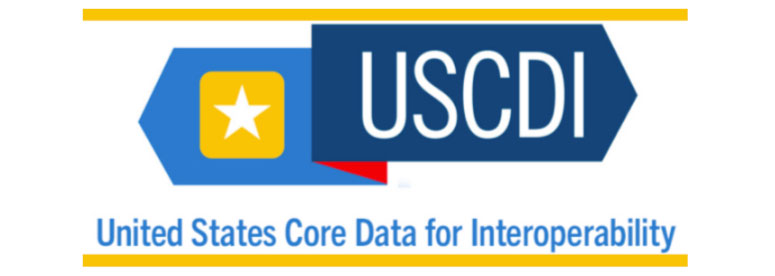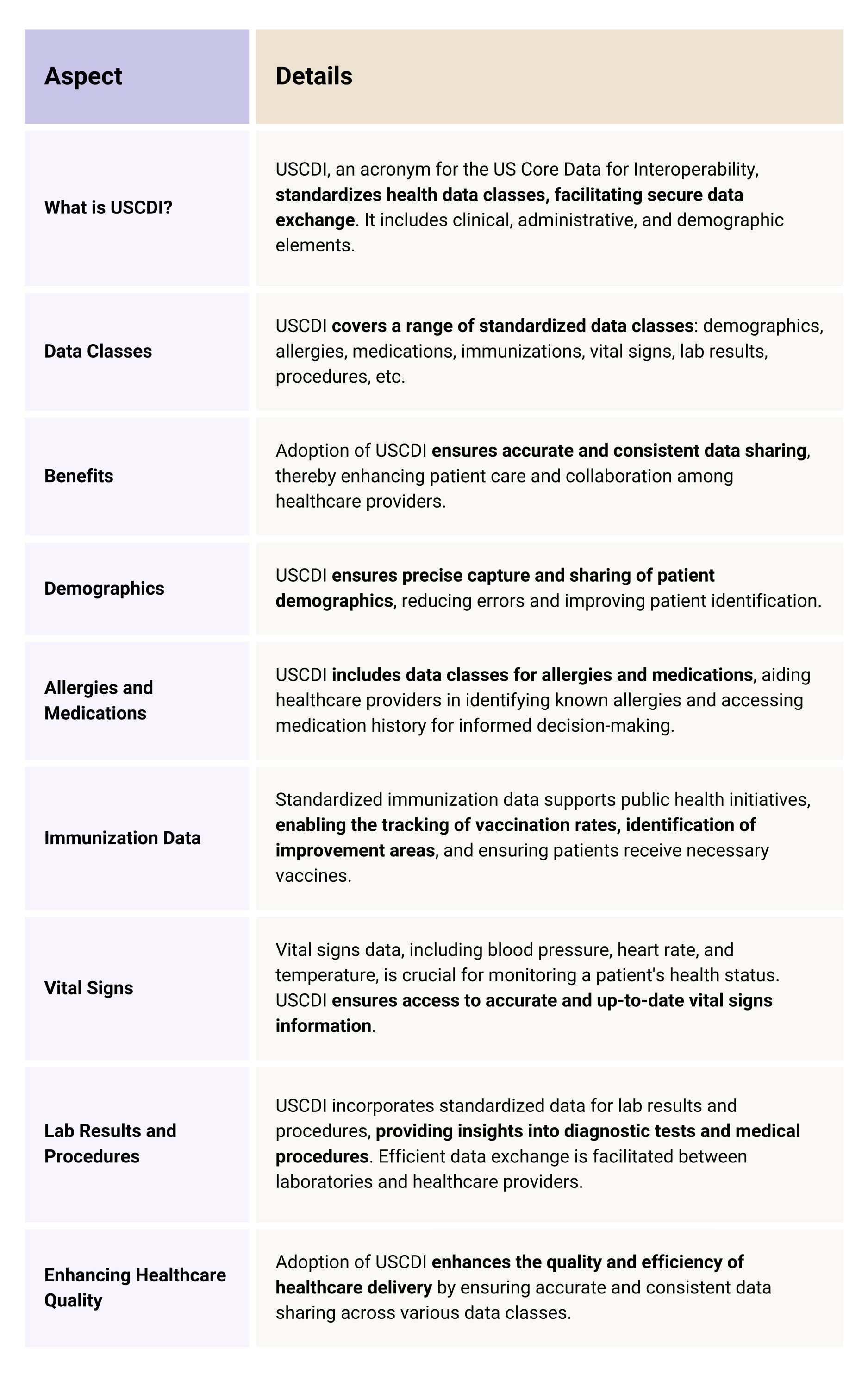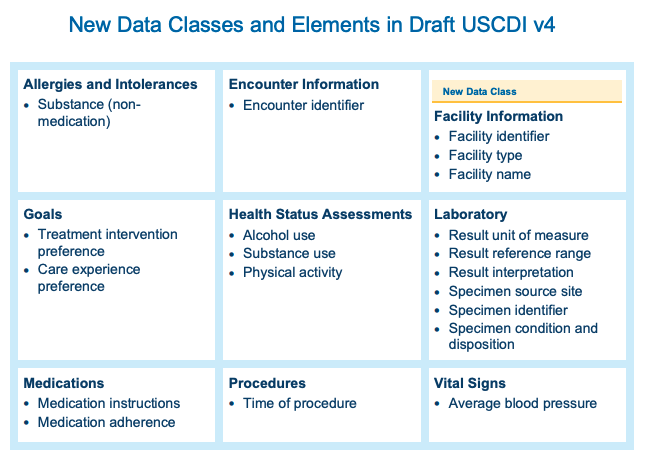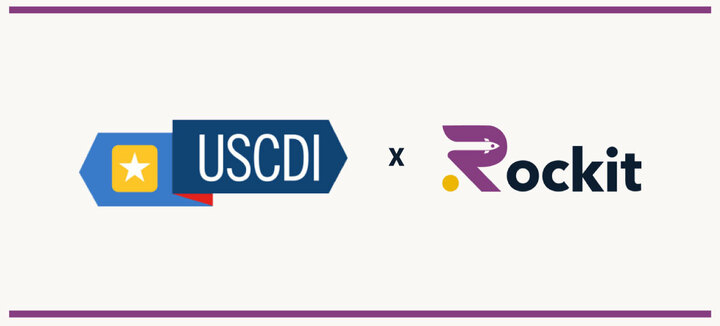EHRs are not a novelty anymore as the need for seamless interoperability with different healthcare systems have become evident. Responding to this critical demand, the United States Core Data for Interoperability (USCDI) aims to develop standards for exchanging health data within the complex web of the American healthcare system.

This article offers insights into the USCDI territory and navigates through the latest standards, unraveling its myriad applications, exposing its significance within the healthcare ecosystem, addressing challenges of implementation, and peering into the future prospects that it harbors.
Understanding USCDI
The roots of USCDI are embedded in the 21st Century Cures Act. It was designed to increase the speed of new medical innovations and their effectiveness in reaching patients. Therefore, at its core, USCDI represents a key element in the larger effort to promote interoperability and share health information in a secure manner.
USCDI, also known as the US Core Data for Interoperability, is a major framework for standardized health data exchange in healthcare. It was designed to help in efficiency and security, containing essential clinical, administrative, and demographic data elements.

Wielding the Power of USCDI
The USCDI serves as a foundational framework for several key use cases within the healthcare industry. Let’s explore some of its primary uses:

Data Sharing and Care Coordination
The adoption of USCDI enables healthcare organizations to seamlessly exchange essential patient information. This enables caregivers to make informed decisions, ensure continuity of care, and avoid redundant tests or procedures. The use of standardized data classes in the USCDI results in better care coordination, better patient outcomes, and lower healthcare costs.
Health Information Exchange and Interoperability
The USCDI acts as a central force propelling interoperability within the healthcare domain. Healthcare systems, electronic health records (EHRs), and health information exchanges (HIEs) will be able to communicate with each other using standardized data classes. This will ensure a secure and efficient exchange of health information. Interoperability improves the care delivery process, supports innovations in healthcare, and provides data for research.
Aims of the USCDI
The USCDI holds immense importance in the realm of healthcare interoperability. Here are some key reasons why:
Enhanced Patient Care
Healthcare organizations should follow the USCDI standards to improve patient care by ensuring smoother data exchange. The standardized data classes enable medical providers to have the most updated and complete patient information for accurate clinical decision-making, diagnosis, and personalized treatment.
Streamlined Data Exchange
USCDI makes it easier to share data in different healthcare systems. Using a common set of standards saves time and resources that would otherwise be spent on manual data normalization and transformation. Error reduction, enhanced data accuracy, and smooth information exchange when it counts the most.
Facilitates Innovation and Research
USCDI’s standardized data classes offer a strong base for healthcare innovations and research. This allows researchers and innovators to have access to huge population datasets for conducting population health studies, clinical studies, and the development of novel healthcare solutions.
USCDI Version 4 in a Glimpse
The United States Core Data for Interoperability (USCDI) standards are continuously evolving to keep pace with advancements in healthcare and technology. The latest version, USCDI v4, was released in July 2023 and outlines the specific data elements and clinical concepts that need to be included for effective interoperability.
Key Updates in USCDI v4
Addition of new data classes and elements
USCDI v4 added 20 new data elements and one new data class to address emerging areas in healthcare, such as social determinants of health and patient-reported outcomes.

Enhanced data quality standards
USCDI v4 introduced stricter data quality standards to ensure the accuracy and consistency of healthcare data exchanged between systems.
Improved alignment with other standards
USCDI v4 was harmonized with other healthcare standards, such as HL7 and FHIR, to facilitate seamless data exchange across different platforms.
Challenges with USCDI Implementation
While the USCDI brings significant benefits to the healthcare landscape, its implementation is not without challenges. Some of the main challenges include:
1. Adoption and Integration: Healthcare organizations must invest in the necessary infrastructure and technology to effectively integrate the USCDI framework within their existing systems.
2. Data Governance: Establishing robust data governance policies and procedures is crucial to ensure data privacy, security, and integrity while adhering to USCDI standards.
3. Provider Engagement: Encouraging and educating healthcare providers about the importance and benefits of USCDI adoption is essential for successful implementation.
USCDI And Rockit Development Studio

Recognized for its proficiency in healthcare software development, Rockit Development Studio distinguishes itself by thoughtfully incorporating its offerings with essential USCDI data classes.
With a focus on healthcare data attributes like demographics, allergies, medications, immunizations, vital signs, lab results, and procedures, Rockit ensures that healthcare providers benefit from accurate, standardized, and seamlessly shared data.
Our dedication to data quality, adherence to USCDI standards, and the ability to create cutting-edge solutions make us the perfect partners for our healthcare app development goals. To learn more about our services, submit an appointment request today.

